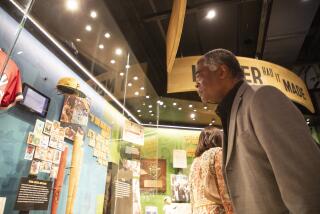Baseball Providing Another Stage to Salute War Effort
- Share via
In the spirit of the times, baseball is attempting to tie a yellow ribbon around the 1991 season even as the campaign gets under way. The military presence at ballparks, normally limited to ceremonies attendant to the national anthem, is rising dramatically as major-league franchises stage Opening Day festivities. To the victors in the Persian Gulf war belong the honor of throwing first pitches from coast to coast.
According to the commissioner’s office, the vast majority of clubs that played their first home games or reported probable pitchers for forthcoming openers was employing members of the armed forces. And that doesn’t include the Texas Rangers, whose general partner invited his daddy, the Commander-in-Chief, to usher in the new year. In addition to President Bush, other members of his administration invited to unlimber their throwing arms included Vice President Dan Quayle in Baltimore and Secretary of Defense Dick Cheney in Atlanta. Alas, Cheney had no defense against the weather and his was the only pitch recorded at Atlanta-Fulton County Stadium on Tuesday night before rain postponed the game between the Braves and the Dodgers.
Still, most of the attention centered on uniformed personnel. The Yankees have proudly announced that they’ve secured Gen. Colin Powell, chairman of the Joint Chiefs of Staff, for their opener Monday against Chicago. Technically he wasn’t a war hero in the sense of Air Force Capt. Steven Tate, who threw out the first ball in Detroit on Monday and received the loudest ovation of the afternoon after it was revealed he was the first coalition pilot to down an Iraqi jet. But Powell is a New York native and a soldier with a very large profile.
Certainly, Powell outranked the four first-pitch performers gathered by the Mets on Monday. They included staff sergeants from the Marine Corps and Army, a Navy flier and an Air Force captain, all of whom saw action in the Gulf. Not to be outflanked by the club in the Bronx, however, the Mets also added a second Banner Day to their promotional schedule. The parade of banners before Saturday’s contest against the Expos is for the express purpose of saluting the troops that participated in Operation Desert Storm.
If this wholesale recruitment of servicemen seems a little heavy-handed for baseball, it suits the mood of a country bent on self-congratulation. Pro football is more accustomed to wrapping itself in the flag and it was football analogies that many generals used in the daily war briefings that captivated the nation and sent the ratings of CNN skyward. But baseball wasn’t totally ignored. I personally heard two generals quote that revered military strategist, Yogi Berra.
Nevertheless, the quick end to the conflict in the Middle East was a seasonal break for baseball, which got the first shot, so to speak, at the returning combatants. The NFL was haunted throughout the playoffs by the imminent invasion and its possible repercussions. It did manage to make the best of the situation at the Super Bowl by including children of service personnel in its halftime show, by passing out American flags and by designating Whitney Houston to sing the Star-Spangled Banner before the game. Houston’s rendition was particularly memorable and widely replayed in the months since.
But the NFL doesn’t resume until September and, by then, America may be preoccupied with another topic, perhaps even something as depressing as unemployment. The World League of American Football did make an attempt to curry favor when the New York-New Jersey Knights invited active servicemen to attend their first home game free of charge. However, the team’s dismal performance in a 27-17 loss to the Frankfurt Galaxy on Saturday night brought to mind Beano Cook’s acerbic line about baseball a decage ago.
When American hostages were released by Iran, commissioner Bowie Kuhn announced that they would receive lifetime passes to major-league games. Cook, the maverick football commentator, took exception to the offer. “Haven’t they suffered enough?” he asked.
Considering that the Knights were credited with 12 fumbles, suffered 10 sacks and managed only 29 yards passing with their run-and-shoot offense, it was questionable how much enjoyment anyone derived from the team’s third defeat in as many games. Then again, it could be said that the soldiers, sailors and aviators admitted to Giants Stadium got their money’s worth. Unfortunately, the team that might have benefited most from the association, the New Jersey Generals, died in the wreckage of Donald Trump’s first financial miscalculation a few years back.
Instead, baseball has rushed to identify with the successful war effort. Whereas the prominent placement of flag patches on the uniforms of college basketball players inspired some controversy, small U.S. decals have quietly been affixed to the back of major-league batting helmets. Since there is a team in both the National and American Leagues with a Canadian mailing address, the Maple Leaf also has been added.
It would appear that batting helmets are of sufficient size to display the flags of all coalition members. Why not the Union Jack or the Tri-Color or the Saudi standard? Well, that’s a subject for another day.
Johnny is marching home again and baseball is standing in tribute. And if it should happen to catch some reflected glory, that wouldn’t be unwelcome. After all, according to the hoariest baseball myth of all, the sport was created by Abner Doubleday, an officer and gentleman trained at West Point.
More to Read
Go beyond the scoreboard
Get the latest on L.A.'s teams in the daily Sports Report newsletter.
You may occasionally receive promotional content from the Los Angeles Times.










